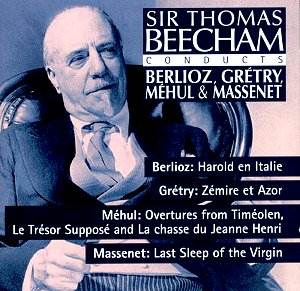Beecham's love affair
with the Gallic muse was no temporary
dalliance. It can be traced from his
first concert to his very last. The
record catalogue also carries the evidence.
The splendid Sony UK Beecham series
keeps enthusiasts alternately satisfied
and on tenterhooks. For all that we
pour scorn on Sony at an international
level the artistic judgement and perceptive
choices of the UK and French outfits
continue to please. The notes for the
Beecham series are just as much an exemplar.
Whoever chose Graham Melville-Mason
to provide the commentary has nothing
to be ashamed of. GM-M's notes evince
the drudgery of research but cloaked
in brilliance of expression.
Beecham's Berlioz is
rightly famed. His Harold bloomed
from its beginnings in concerts with
Tertis in 1933, to Primrose in 1942
and 1952 and Riddle in 1953 and 1956.
With an orchestra in
which personality was not a dirty word
we find Gerald Jackson (flute), Terence
MacDonagh (oboe), Jack Brymer (clarinet),
Gwydion Brooke (bassoon), Dennis Brain
(horn), Leonard Brain (cor anglais)
and David McCallum (violin).
What strikes me about
this performance is Beecham's sauntering
'sprung' way with Pilgrims' March
and his silky seamless supercharged
continuity of line in Harold in the
Mountains and The Orgy. There
might be more snap and smash to the
Orgy but its smoothness of lyrical
line are compensation enough. Primrose
is steady, pliant, and responsive; the
ideal complement to the orchestra or
vice versa. The mono sound is secure
and, if this makes sense, very easy
and pleasing to listen to.
The fillers remind
us of the young Beecham poking around
the librairies and bibliothèques
of 1904 Paris. From these forays
he built his library of Grétry
and Méhul, Isouard and Monsigny.
The Zémire is a soupy
but uncongealed confection with a prominent
rounded line for the cello. The Massenet
is another classic lollipop in the Zémire
mould although the lovely fade at
the end gives signs of having been aided
by the technicians of the time. The
three Méhuls include some real
rarities. Timoléon is
lively and of a sweet though unsleepy
disposition - an approach to Mozart's
opera overtures via Berlioz. It sports
some mercurial flute solos. Le Trésor
Supposé is similarly shaped
but much more earnest; not as successful.
All is forgiven with the more famous
La Chasse (a classic of the 78
era). Honeyed work and sensitive playing
down to a silky pianissimo characterise
the introduction. From a serenade-like
tune of Mozartian 'fall' we move into
a magically balanced dialogue of hunting
horns sounding distantly. Then comes
an elegant chasse which has the grand
manner of Mozart's Jupiter and
the lightning strikes of Beethoven's
Seventh. The blast of the French horns
in the final pages is unforgettable.
Beecham soothes and
stimulates in this generous collection
of the familiar and the unfashionable.
Rob Barnett
see also review
by Jonathan Woolf
